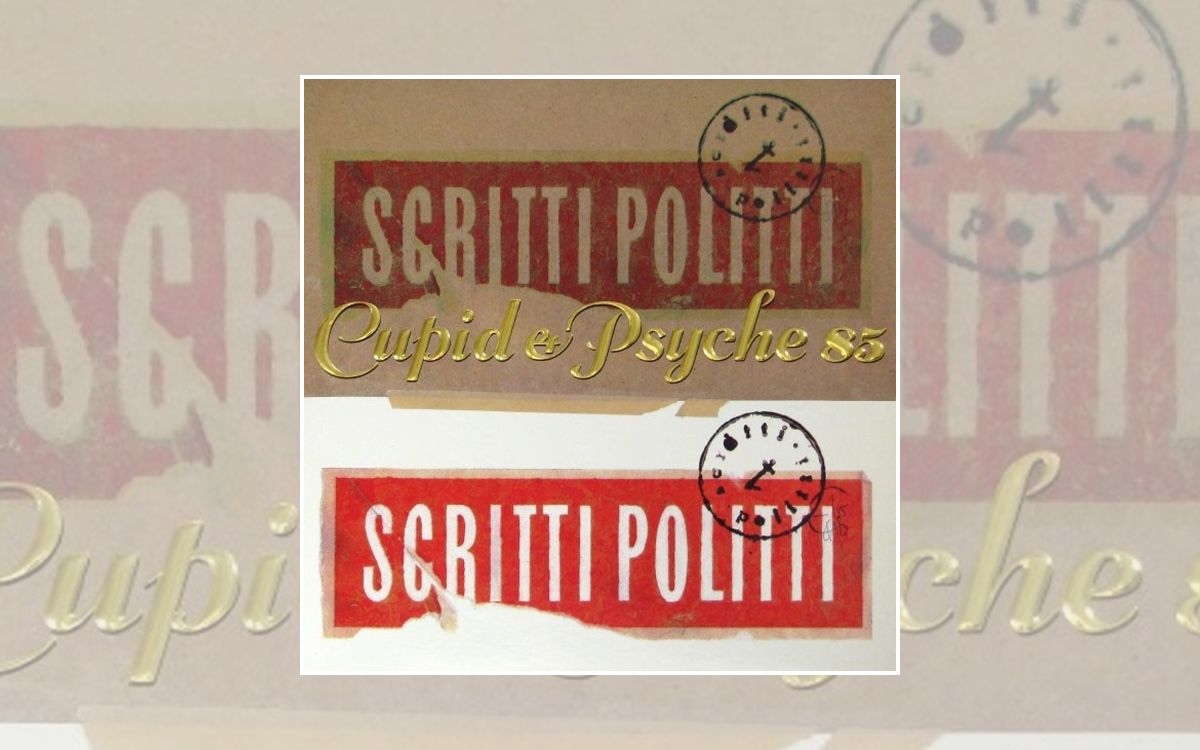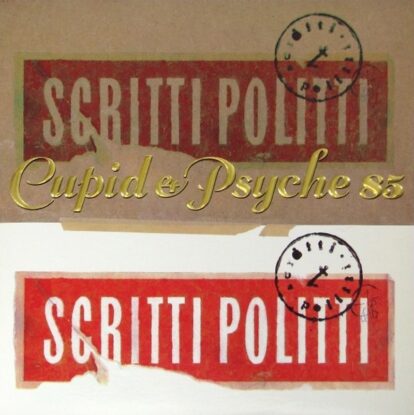By the mid-80s, Green Gartside had turned his back on post-punk to craft Scritti Politti’s sleek pop masterpiece

At the dawn of the 1980s, if you were to predict that squat-dwelling anarcho-Marxist ‘Communist intellectuals’ would make one of the defining and most slick pop albums of the forthcoming decade, you’d have got some odd looks and maybe some enquiries as to where you were getting your drugs.
That a group who’d detailed the means of production and costs of recording on the sleeves of their singles would be working with one of music’s most legendary figures within five years, and spending three days on a vocal, seemed like a wild pipe dream, but Scritti Politti were no ordinary group and remaining sole member Green Gartside was no ordinary pop star. In fact, when he did become an actual pop star, it caused massive distress and hospitalisation.
For an operation forged in such a DIY ethos, the cult of Scritti Politti was already growing when they issued their debut album, 1982’s Songs To Remember. Green had begun expressing frustration at Rough Trade and how they appeared to be signing up ‘silly bands’ instead of focusing on those that looked like they were getting somewhere ie: Scritti Politti.
Having also knocked the ‘Communist intellectuals’ first iteration of Scritti on the head, and disillusioned with what the independent scene had become, Green moved to New York in 1983 in order to soak in the sounds of the hip-hop that he loved in order to follow his dream.
Songs To Remember
That dream had been brought on by an onstage panic attack, which led to Green moving back to his parents’ home in Wales. While there, he listened to lots of Black American music and read lots of European thinkers and decided to bin the DIY to make pop.
Despite the lack of love developing between Green and Rough Trade, it was label founder Geoff Travis who put Green in touch with David Gamson after Gamson had released a cover of The Archies’ Sugar Sugar in 1981. The two met with the original idea of Green working on a one-off project and decided to buddy up after Gamson played Green Small Talk on the piano.
The pair of them then went through no end of versions of the song, with Green visiting Gamson in New York and increasingly spending more time there. Green had already been label-shopping with versions of Absolute, Wood Beez and Don’t Work That Hard and Gamson would do the arrangements on the demos. After Green met producer Arif Mardin, Gamson thought that would be the end of his involvement, until an impressed Arif called Gamson and told him to get down to the studio and the three of them recorded those songs together.
Green had long wanted to know what it would be like to make a giant slick album and to work with music giant Arif Mardin, whose recent work with Chaka Khan had impressed him. Mardin’s CV was quite impressive with steering the Bee Gees towards disco, and producing Queen, Hall & Oates, Diana Ross and Aretha Franklin among thousands of others.
In fact, it would be far easier to list the acts that hadn’t worked with Mardin during his 30 years at Atlantic Records as producer, arranger and eventually vice president.
Meeting Of Minds
The third piece in the new incarnation of Scritti came with the addition of producer Fred Maher, who’d been a teenage prodigy playing drums in various avant garde New York acts gravitating to the band Material that brought him into Gamson’s orbit. Maher’s pedigree gave him a grounding in funk and he was able to add the boom to the sound that Green was after.
“It became a New York-based thing, but not exclusively,” Gartside explained to Uncut. “We’d come back to London to do some recording. Fred Maher was an old friend of David’s. What the three of us shared was a great love for things like Henry Cow and Robert Wyatt. They were knowledgeable about the British underground, and musically sophisticated. Fred’s dad was a writer about jazz. David’s father was an assistant to Leonard Bernstein. They were incredibly savvy. Their other great passion was pure pop music and burgeoning hip-hop and R&B. We were completely on the same page in terms of influences and enthusiasms.”
It was a fortuitous combination for the man who’d been detained at US customs for several hours due to wearing a tricorn hat (and being labelled ‘WEIRD’ on his passport). “The same will behind my desire to make punk was behind my desire to make big beat pop,” Gartside told The Guardian in 2011. “The idea of the critical privileging of rock music as the unmediated, the truthful and honest as against pop as the derivative, mediated, commercial and superficial… that interested me. After the album came out I got endless stick for making bourgeois pop music, but stick has never bothered me.”
Don’t Work That Hard
Talking to Pete Paphides, Green explained the transition: “I thought that a music that disrupted the conventions of pop music, the conventional structures of song, harmony and rhythm, was a music more in keeping with the ideas of Derrida, Lacan, Foucault… a world of unstable meanings, schizophrenic rebellion against capitalism – they were the ideas around [back then], which held sway with my bandmates who largely came from a Marxist background. And there did seem to be a sonic correlate between a scratchy, dissonant guitar music that wasn’t too macho, and an anti-professionalist, anti-capitalist position. There was the idea of the de-centred subject, the individual in crisis… but then, it occurred to me that Michael Jackson was no more a centred and unified subject than Captain Beefheart.”
David Gamson recalled to Sound On Sound: “That album took a long time to make, and there were a lot of changes even in technology through the course of making that record… It was the most digital sounding analogue record ever made, which is what a lot of people don’t like about it. It was one long very exhausting grind. I got physically ill at the end of that record because I was so exhausted.”
Surrounded by top drawer musicians brought in by Mardin, it was a long way from Scritti’s origins, as Green reflected: “Having not long come out of making scratchy guitar noises at the Electric Ballroom, to be in Atlantic Studios or the Power Station with musicians of that calibre was deeply unsettling. Arif was very good at helping me through that, but it took its toll. The nightlife in New York at the time was amazing – so there was a lot to enjoy. It was ridiculously profligate business.”
Downward Spiral
As the success of Cupid & Psyche 85 grew around the world, reaching No.5 in the UK and a respectable No.50 in the States, although Green had initially liked the look of being a pop star, it soon became a case of ‘careful what you wish for’ once the reality started. His horror at being chased down the streets and his discomfort at it all was beginning to show. Interviewed on American Bandstand, Green looks somewhat terrified at being the centre of attention.
Of that moment, Green recalled, in an interview with Anthony Reynolds, that it was, “A lot of madness. That’s when it started to go pearshaped for me. I can remember that very day that it was, ‘Hang on, this is not really the right line of work for me’, that’s what I thought. From that point in time until I was back in Usk a few years later, it just felt wrong. I thought I’d enjoy being a pop star and I was messing around with ‘pop music’ but I wasn’t really, I was just a bit of product. It wasn’t fun. I stopped at that point finding it amusing. It was the insincerity that really fucking pissed me off. They don’t really care. It was just ruthless and heartless and it’ll do your fucking head in, I reckon.”
Pioneering Pop
Reflecting on his moment of altering pop and his year or so of pop stardom, Green wryly recast Hunter S. Thompson’s infamous quote about the TV industry, that “The music business is a cruel and shallow money trench, a long plastic hallway where thieves and pimps run free and good men die like dogs. There’s also a negative side.”
You’d imagine Green being quite pleased at managing to both unfold and critique pop perfection while also bending it to his whim, but not so. “It actually leaves you feeling uncomfortable,” said Green. “There’s a flicker of elation. Stevie Wonder said he liked the album. Then you start to doubt how much of it you could really claim credit for. Because, you had Arif Mardin and all these brilliant players, and you tend to put yourself at the bottom of the list.”
“I mean, it was such a massively expensive record to make — partly because of how slow I was. We were using up all that Manhattan studio time. At that point, I was basically reduced to being terrified every time I opened my mouth. It suddenly dawned on me that I was way out of my league.”
So that was Cupid & Psyche 85. A literate and articulate listen that tried to deconstruct pop music while also illuminating a path ahead for it. It may have hospitalised Green Gartside with all the stress of it all – “I think we sold a million copies around the world and we had Top 10 records everywhere… and that’s when the horror began!” – but it remains a highpoint of the decade and certainly one of the greatest albums of 1985.
The Songs
The Word Girl
The Lovers Rock of The Word Girl was the single that came just before Cupid & Psyche 85, indicating a slightly different sound from the hip-hop flavours of previous singles. But it was not all gleaming New York extravagance, according to Green in the reissue sleevenotes: “We did the vocals for this at a residential studio in the English countryside. It was winter, and from the vocal booth, I could look out of the window across the snow-laden fields. I remember seeing a handful of particularly forlorn-looking sheep standing, staring vacantly, in the drifts as the flakes fell. One, in particular, was eyeing me purposefully. I think my vocal performance somehow captured or embodied something of the plight of that disconsolate ruminant.” Regardless of the sheep, it became Scritti’s biggest hit to date in the UK hitting No.6.
Small Talk
The first song written by Green Gartside and David Gamson in late 1983 in London under what was initially a Gamson project, but which actually led to Scritti Mark II becoming a reality with the addition of drummer Fred Maher. Recalled Gartside, “They were incredibly smart, hip, musically literate New Yorkers, and apart from the profound joy of their friendship, everything they taught me about American contemporary musical culture was absolutely invaluable.”
Absolute
Green referred to this as, “An arrangement that Arif Mardin called ‘Gangbusters from the get-go’. We mixed at Sarm West in London. The gents toilet there was definitely used as an additional reverb. You had to pee really quietly when mixes were going to tape.” David Gamson was also required by Arif to write all the parts for each musician, a new and unusual experience for the producer, especially with top sessioneers such as Steve Ferrone on drums, Paul Jackson Jr on guitar and Will Lee on bass all waiting for their cues. Green admitted that he “did feel beyond terrifyingly inadequate in that company”. The follow-up to Wood Beez, it peaked at No.17.
A Little Knowledge
A duet with esteemed singer BJ Nelson, who was brought to the front having recorded much of the album as a backing singer, A Little Knowledge is a different take on a love song, although probably the most direct on the album, rather than questioning what the meaning, and role, of love that was seen on the other tracks.
Don’t Work That Hard
One of the first songs Green wrote for what would become Cupid, Don’t Work That Hard would probably be seen as this era of Scritti almost on dazzling autopilot, echoing the dimensions and structure of Absolute. That’s not to say it’s poor, it works best as an album track propping up the slightly more stellar surroundings. However, it did help secure a deal for the album.
Perfect Way
A reluctant fifth single from the album in the UK, reaching No.48 in late 1985, Perfect Way became the group’s biggest and only single success in the US, reaching No.11. Perfect Way also had a rather unique afterlife when covered by Miles Davis on his Tutu album, after striking up a friendship with Green. “I had gone through a phase of listening to him when I was an art student but I hadn’t listened to him in a long time,” Gartside told Anthony Reynolds. “When I got to meet him, because I knew my memory was so bad, I made sure that on the occasions I went to meet him in his apartment in New York, I made sure that when I went back to my own apartment I would write it all down.”
Lover To Fall
Cupid & Psyche 85 was a revolution in itself, as Scritti had managed to turn an unlikely array of influences and meld them into a winning combination that would also find itself ruthlessly copied in the next few years. Lover To Fall is quite straightforward production and arrangement-wise, in fact you could imagine this being done by Madonna on her True Blue album, or playing in the background of some high-flying 1980s movie possibly starring Melanie Griffith.
Wood Beez (Pray Like Aretha Franklin)
The origin of Wood Beez comes from part of a lyric from Dave And Ansel Collins’ Double Barrel. According to David, it began life as an acoustic guitar-based number which got arranged into a completely different way. Quite what Arif Mardin made of the nod to Aretha Franklin, having actually produced the records that made her legend, but it obviously wasn’t negative. The first sign of Scritti Politti’s new sound, it became the chart breakthrough peaking at No.10 in April 1984. (Also making No.26 in New Zealand.)
Hypnotize
Renting a Fairlight – they were still out of Scritti’s financial reach despite the major label coin behind them – Hypnotize made hay with it, producing the most playful and textured tracks on the album, it seemed to be an exercise in what was achievable withtechnology. As Green recalled in the album’s sleevenotes, “I spent much of the time making this album with a stomach-churning sense of inadequacy and lack of self-worth. The rest of the time I felt extraordinarily fortunate to be playing the part of someone whose idle fancies had become a reality.” A little lost in the pre-Christmas chart of 1984, it reached No.68.
For more click here
Read More: Into The Valleys – The Sounds Of Wales
Classic Pop may earn commission from the links on this page, but we only feature products we think you will enjoy.



